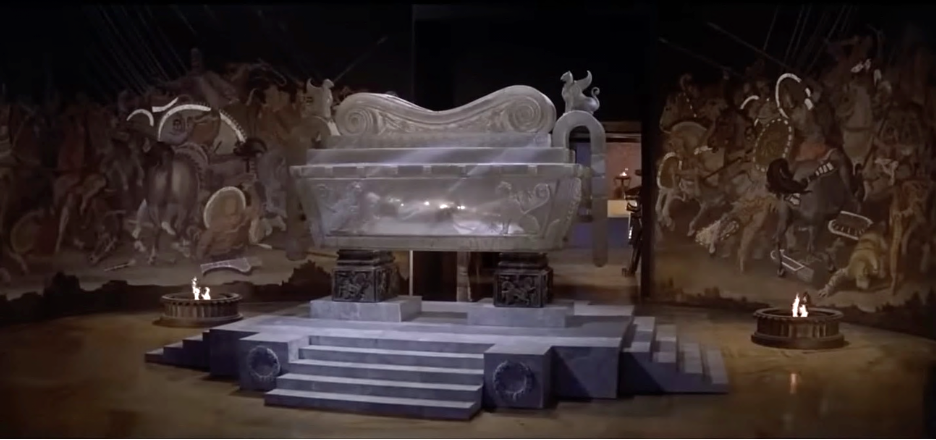Memorials and Ambition in “Cleopatra”
Cleopatra
1963 Director: Joseph L. Mankiewicz
Starring: Elizabeth Taylor, Richard Burton, Rex Harrison
The epic “Cleopatra” made headlines upon its release in 1963.1 This costly production, the most expensive film created up until then, nearly bankrupted Twentieth Century Fox. And although some critics disliked it, it received mostly favorable reviews and was nominated for nine Academy Awards, earning accolades for art direction, cinematography, visual effects, and costume design. It is an opulent, lengthy film about grandeur, power, and ambition.
In 48 BCE, Julius Caesar (Harrison) pursues his enemy, Pompey the Great, to Egypt and discovers he was killed in Alexandria. Once there, as Rome expands its imperial ambitions, Caesar arbitrates between sibling corulers Ptolemy XIII (Richard O’Sullivan) and Cleopatra VII (Taylor). Cleopatra convinces Caesar that her brother should be deposed, a task that Caesar undertakes, and she becomes queen of Egypt. Cleopatra and Caesar become allies and she seduces him, promising him many sons. Later, as they meet at the tomb of Alexander the Great, she proposes that they emulate the great conqueror, explaining that as a couple they would be unstoppable in dominating the known world.
As with the rest of the film, this scene is marked by great splendor. Alexander’s impressive tomb stands at the center of a mausoleum flanked by images of his exploits. The filmmakers took pains towards historical accuracy in this scene and throughout the film. The translucent sarcophagus is made to resemble rock crystal, as legend suggests, revealing Alexander’s body inside. The conqueror is dressed in armor and his face might be covered by a gold mask, perhaps as a reference to the gold burial masks discovered at ancient Mycenae.2 The sarcophagus is based on Roman models, particularly in its tub shape, volutes (scroll-like ornamentations) at top, and seated griffins (mythological beasts that signified the deification of emperors in the Roman world).3
It’s worth noting that Caesar and Cleopatra are not the first to visit the tomb of a famous warrior. Alexander is said to have sought out the burial sites of Cyrus the Great and the legendary Achilles to pay them homage.4 Moreover, several Roman emperors apparently visited the tomb of Alexander, among them, Augustus, Caligula, and Septimius Severus.5
Tombs were of great importance for many centuries, as this was one of the ways prominent individuals would be remembered. Ancient Greek and Roman funerary practices for the elite could be elaborate, costly affairs and could include public feasts, processions, and even entertainments.6 Pilgrimages to Christian and Islamic sacred sites are well known. Popes and cardinals spent much time planning and creating their own memorials; for example, Michelangelo created funeral monuments for Pope Julius II and Cardinal Jean de Bilhères (the famous Pietà in Rome).
The Alexander tomb depicted in “Cleopatra” is an impressive Hollywood construct. It not only inspires Caesar and the Queen of Egypt, but also of the modern viewer. For these two leaders, it serves to motivate their ambitions and the possibilities they could pursue. As a memorial, it assures Alexander’s immortality, if only in the imagination of the spectator.
Copyright © 2025 by Rosi Prieto, Ph.D.
All Rights Reserved
In regards to “Cleopatra” (1963), see also: https://www.meetmeatthemovies.com/p/the-legendary-diva-who-portrayed
The scene in the background is based on the “Alexander Mosaic” representing his defeat of the Persian king Darius III: https://en.wikipedia.org/wiki/Alexander_Mosaic
The original golden coffin was apparently melted down and replaced with that of glass or crystal: https://en.wikipedia.org/wiki/Tomb_of_Alexander_the_Great
The filmmakers might be referencing the so-called Mask of Agamemnon from Mycenae, although Alexander’s is much more naturalistic: https://www.brown.edu/Departments/Joukowsky_Institute/courses/greekpast/4917.html#:~:text=The%20mask%20was%20created%20by,National%20Archaeological%20Museum%20in%20Athens.&text=Works%20Cited:,:%20Cambridge%20University%20Press%2C%202001.&text=Posted%20at%20Dec%2012/2007,to%20have%20been%20no%20exception!
Alexander believed himself to be a descendant of Achilles and Herakles and, ultimately, of Zeus, king of the gods: https://www.worldhistory.org/article/925/alexander-the-great-as-a-god/




